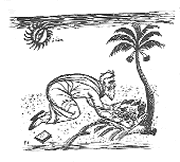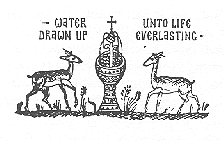Acquiring an Orthodox Mindset: Holy Tradition, the Criterion of Truth
This selection of articles introduces the reader to the concept of Holy Tradition—the life of the Holy Spirit in the Church, expressed in the "phronema ton pateron" (Gr., the "mind of the Fathers)—as the spiritual authority of the Church and the very criterion of Truth. Articles that discuss the interrelation between the practice of the virtues and a person's ability to enter into and understand this mindset are also included.

"Following the Holy Fathers": Father Georges Florovsky and the Patristic Mindset. An excellent introduction to the "Phronema page."
St. Vincent of Lérins and Catholicity.
St. Gregory Palamas and the Tradition of the Fathers, by Fr. George Florovsky. This is Ch. 7 from The Collected Works of Georges Florovsky, Vol. I, Bible, Church, Tradition: An Eastern Orthodox View (Vaduz, Europa: Buchervertriebsanstalt, 1987), pp. 105-120. This classic work is now out of print but still available. Check with Eastern Christian Supply Company.
The Mind of the Orthodox Church, excerpts from the book by Metropolitan Hierotheos of Nafpatkos. This book is indispensable for one who wants understand what it means to acquire the Mind of the Church. A must read.
Let This Mind Be In You, by Father David Moser. Especially important for converts.
Sermon on the Sunday of St. Gregory Palamas (Great Fast 1998): by Archbishop Chrysostomos of Etna. Profound words on the significance of this great Saint for the Orthodox Church.
Paradosis and its Noetic Base: Towards a Spiritual Statement of Tradition in Orthodox Thought, by Archimandrite (now Archbishop) Chrysostomos and Hieromonk (now Bishop) Auxentios. This is the summary chapter (V) from Scripture and Tradition (Etna, CA: Center for Traditionalist Orthodox Studies, 1994). Appended to this chapter are two discussions about the misuse of St. Vincent's Canon. This 87 page book is the single best overview of the concept of Holy Tradition and its role in the life of the Church. Read an excerpt from the Introduction.
Introduction to Humility, by Bishop [now Archbishop] Chrysostomos of Etna (Etna, CA: Center for Traditionalist Orthodox Studies). This is included here because the cause of much innovation today is pride—a failure to humbly bow before the witness of Holy Tradition and be obedient to its spiritual guidance. Innovation is the offspring of the mindset of the Serpent: "Did God really say?" Besides the introduction, I include here this excerpt from the book which illustrates this point and is thus very relevant to the whole concept of developing an Orthodox mindset.
The Monastic Life: In Response to a Modernist Abbot's Observations. This article was added in part because it so eloquently lays out the relation between praxis and theoria. "By attention to externals, we affect internals; and by the restored internal state, external attributes are affected."

Remarks to a Priest on Holy Tradition and Modernism, by Archbishop Chrysostomos.
The Articles on the Terms "Canonical" and "Canonicity": I highlight this collection of articles in this section for two main reasons: 1) these terms are misunderstood by many Orthodox today; and 2) these terms are integrally related to the concept of spiritual authority and the concomitant evaluation of such on the basis of Holy Tradition.
Dogmas and Opinions, by Fr. Michael Pomazansky. A discourse on the nature of Holy Tradition.
A Commonitory, by St. Vincent of Lérins.
"...we receive the divine Canons with delight, and we maintain wholly and unshakably the enactment of these Canons set forth by the allpraised Apostles, the holy trumpets of the Spirit, and by the six holy Œcumenical Synods, and those assembled locally to issue such commandments, and by our holy Fathers. For they all, being enlightened by one and the same Spirit, ordained what is beneficial."
—From Canon I of the Seventh Œcumenical Synod
"It is not enough to be acquainted with the texts and to know how to draw from them quotes and arguments. One must possess the theology of the Fathers from within. Intuition is perhaps more important for this than erudition, for intuition alone revives their writings and makes them a witness. It is only from within that we can perceive and distinguish what (actually) is a catholic testimony from what would be merely theological opinion, hypothesis, interpretation, or theory... Only in the integral communion of the Church is this 'catholic transfiguration' of consciousness truly possible. Those who, by reason of their humility in the presence of the Truth, have received the gift to express this catholic consciousness of the Church, we call them Fathers and Doctors, since what they make us hear is not only their thought or their personal conviction, but moreover the very witness of the Chruch, for they speak from the depth of its catholic fullness. Their theology evolves on the plane of catholicity, of universal communion."
—Fr. Georges Florovsky, "The Ways of Russian Theology" in The Collected Works of Georges Florovsky, Vol. IV, Aspects of Church History (Belmont, MA: Nordland, 1987), pp. 191, 192

